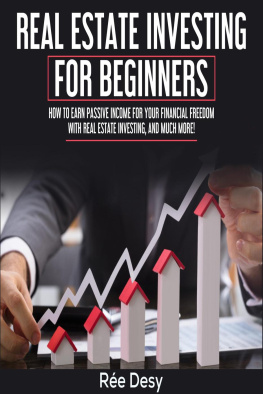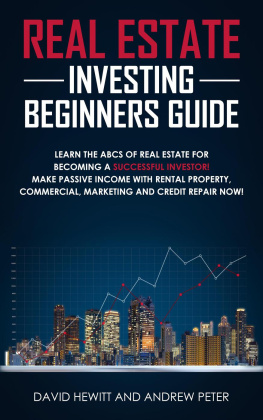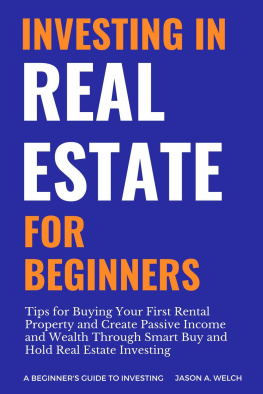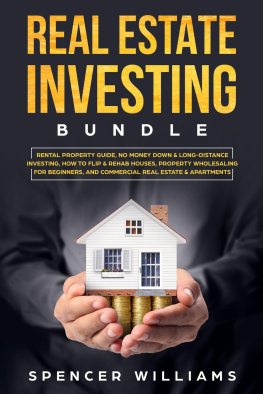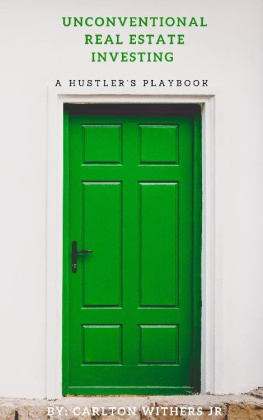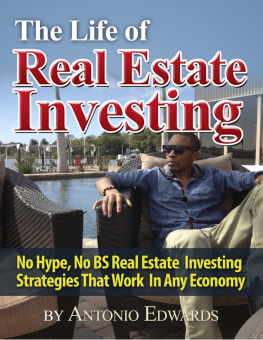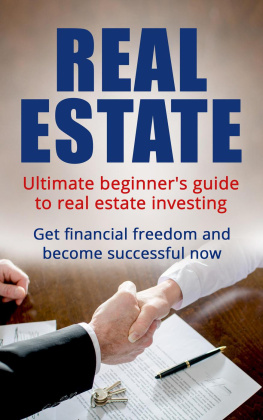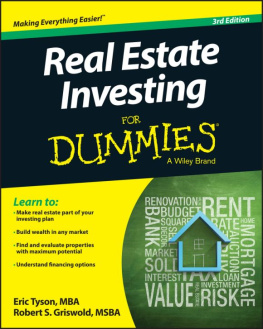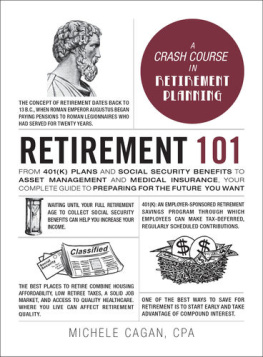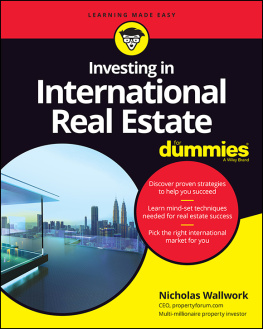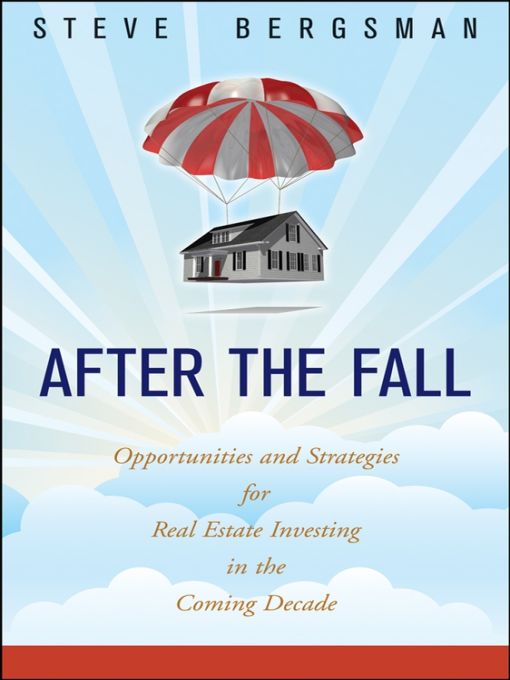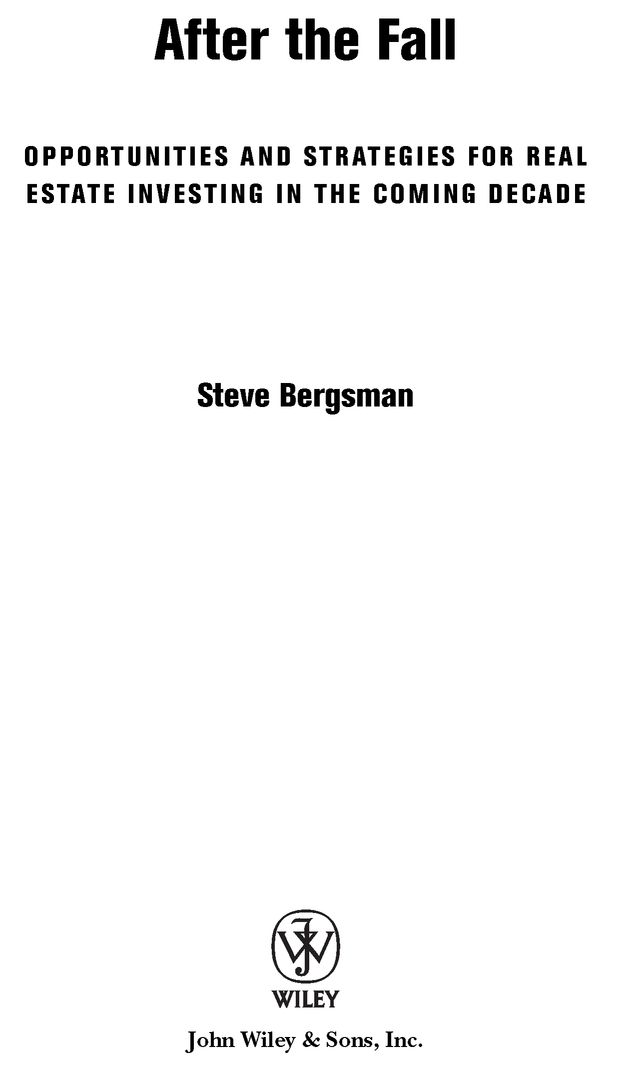Table of Contents
To my oldest and dearest friend
Ed Moss
who continues to reposition his real estate holdings.
Acknowledgments
Each book I write is an entirely different process. For my last book project, I found myself shuttling about the world, tracking down sources on Pacific Islands or in thickly forested northlands. In a way Im embarrassed to admit this, but for After the Fall: Opportunities and Strategies for Real Estate Investing in the Coming Decade, I never left my office. Off the top of my head, I cant recall one interview that was face-to-face, and there were many, many interviews done for this book.
This is where longevity pays off. I knew so many players in the real estate and mortgage industries, having written on the subjects for over two decades, that many sources, when asked if they would like to be interviewed over the telephone for this book project, immediately answered yes. For the sources I didnt know, it took a round or two of e-mail correspondence to convince them I was a legitimate writer with a legitimate project. I suppose if they were distrustful, they could have always googled my name to find out my background.
As it turned out, I could count the number of sources on one hand who turned me down. Either they all trusted me or they all had good Internet research skills.
Anyway, a lot of very smart people helped me to write this book, and I wish to acknowledge their help. As always, if I missed mentioning a source, it wasnt on purpose as my intention is to thank each and every one for sharing knowledge, experience, and market insights.
In order of appearance: Mitchell Hersh, Sam Chandon, Dan Fasulo, David Twardock, Douglas Shorenstein, Robert Bach, Colleen McPherson, Mark Weinberg, Luciana Suran, Michael McKiernan, Brad Copeland, Leonard Sahling, Michael Dermody, Charles Schreiber, Kevin Wilkerson, Matthew Anderson, Jim Koury, Sam Davis, Chauncey Mayfield, Dan Ansell, Christopher Volk, Richard Moore, Michael Pollack, Peter Donovan, Matthew Lawton, Richard Campo, Greg Willet, Gleb Nechayev, Lisa Sarajian, George Skoufis, Richard McBlaine, Jay Biggins, Dan Rashin, Jason Hartke, Mark Palmer, Anthony Irons, Matt Garlinghouse, Nicholas Eisenberger, Christopher Desloge, Olivia Millar, Nicholas Stolatis, Lauralee Martin, J. Allen Smith, Carlos Martin, Douglas Wilson, Matt Wanderer, David Tobin, Gil Tenzer, Russell Bernard, Ray Milnes, Richard Berry, Spencer Garfield, Pat Ford, Jack Corgel, Mark Woodworth, Kapila Anand, Ted Mandigo, Glenn Schultz, Peter Hooper, Jared Sullivan, Jonathan Dienhart, Richard DeKaser, Jed Smith, Celia Chen, Mel Gamzon, Robert Kramer, Raymond Lewis, David Schless, Richard Swerdlow, Walter Molony, Jack McCabe, Brian Gordon, Mario Greco, Brad Capas, Jules Marling, Robert Hartwig, Terry Butler, J. Robert Hunter, Eric Goldberg, Alex Winter, Paula Aschettino, Dennis Burke, Charlie Melancon, Natalia Siniavskaia, Elliott Eisenberg, Gerald Prante, Bert Waisanen, Charles Longino, Don Bradley, Gary Engelhardt, David Goldberg, Douglas Bibby, Charles Leinberger, Arthur C. Nelson, John McIlwain, Tom Booher, Bob Moss, Andrew Weil, Michael Novogradac, Nicolas Retsinas, Howard Nussbaum, Ed Kinney, Christine Karpinski, Liam Bailey, Ron Baron, William Van Gelder, Pat Kelly, Mark Lunt, Robert Goldstein, Jared Beck, Jamie Cheng, Nick Copley, Michel Neutelings, and Alfredo Merat.
Introduction
Around mid-year 2006, I was chatting with an acquaintance at a local coffee shop and he was telling me the story of a friend of his in California who had strung together a series of home purchases. She would buy one home, take a second mortgage on the property, then use the money from the second to acquire another property. She was so successful at this game that she had accumulated something like a dozen Southern California properties; all but one (where she lived) were rentals. It didnt appear the rental rates were covering the mortgages, but that was all right to the woman because home values were skipping higher every month. On paper she looked like a millionaire.
My friend, who was a successful businessman, wasnt entirely comfortable with his friends real estate position and asked me what she should do. I told him the outlook for residential real estate had turned sour and she should start selling as quickly as possible.
In retrospect, if she had followed my advice, she probably would have escaped the collapse of the residential real estate market in 2007. But, to illustrate how brilliant I really am as a pundit, that same year, I found myself being interviewed by a local publication and was asked what I thought about the subprime mortgage market, which was suddenly making a lot of people nervous. My response went something like this: Subprime only represents a small portion of the mortgage market. Factually, I was right, but my implied message was off the mark.
Such is the soothsaying business these days. If you get right 50 percent of whatever you might be divining these days, you should consider yourself lucky.
This is what no one predicted: When the residential real estate market bubble finally burst as it did in 2007, the collapse would be so sudden, so quick, and so deep, that a little over a year later it would mean the end of the independent investment bank, an institution that dominated Wall Street since the Glass-Steagall Act of 1933.
Heres a journalists story on how fast the collapse came. In June 2007, I was asked by my editor at Mortgage Banking magazine to write a story on Tucson, Arizona-based First Magnus Financial Corp., which was one of the countrys largest privately held mortgage companies. Earlier that year, National Mortgage News ranked First Magnus as the ninth largest Alt-A lender in the country with $2.6 billion in volume.
The story was written, edited, and ready to be published when in August First Magnus filed for bankruptcy protection. In less than two months, it went from a successful entrepreneurial company with over 5,000 employees and a bright tomorrow to nothing. The company evaporated over the course of six weeks, and First Magnus executives never saw it coming. When I spoke with them in June, the future was written in hi-liter colors all over their faces.
In the course of interviewing people for this book, when picking out the culprits of the great real estate mortgage industry devaluation, a number of sources mentioned the press. I thought that was a bit unfair, not only because Im a journalist, but for a couple of years starting around 2005 and certainly through 2006, many financial publications were calling the crazy, rampant housing sector a bubble that was about to burst.
Bubble, bubble! the columnists called out, quoting market analysts, investors, hedge fund execs, and equity market decision makers. And, of course, its all toil and trouble nowso much for bubble, bubble.
As a scribe who writes for almost a dozen different real estate and financial publications on a regular basis, Ive personally written dozens of stories about the impending bursting of the housing bubble. Now I wonder who read those articles.
Not being an industry insider, I wonder what happens when you sense the end of the good times is nigh. Judging from what happened to lenders, homebuilders, Wall Street, big banks, and so on, I guess you do nothing and keep running forward for as fast and as far as you can before everything collapses around you.




